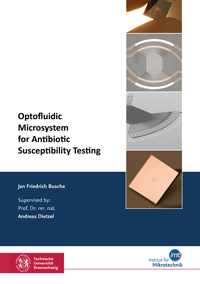
Shop : Link
Shop
Link
48,80 €ISBN 978-3-8440-8311-8Softcover182 pages57 figures269 g21 x 14,8 cmEnglishThesis
November 2021
New publication
Jan Friedrich Busche
Optofluidic Microsystem for Antibiotic Susceptibility Testing
Nosocomial infections with antimicrobial resistant bacteria are on the rise and even reserve antibiotics are losing their effectiveness. In case of a bacterial infection with the risk of sepsis, the most appropriate antibiotics must be prescribed quickly. Ineffective antibiotics risks patients’ lives, unnecessarily administered antibiotics endanger their long-term effectiveness. This would make many operations and therapies routinely performed today impossible. Currently, detection of antimicrobial resistance is often done off-site and takes too long. Rapid point-of-care testing is needed to achieve medication with effective antibiotics in time. This could be achieved with phenotypic microfluidic diagnostic methods that work label-free.
In this thesis, different approaches for bacterial immobilization and subsequent growth detection are investigated. A microfluidic immobilization principle is combined with an asymmetric diffraction grating to concentrate the bacteria and study their growth label-free under the influence of antibiotics.
Results of CFD simulations of the cross flow immobilization suggested the shear stress in the systems to be approximately half the value reported to be growth limiting for E. coli cells. In line with that, the interferometric measuring principle enabled bacterial growth detection in less than 4 h with a doubling time of 79 min and sample volumes of 187.2 μL and also allowed observing the effect of applied antibiotics label-free. To complete this concept, an improvement of the fabrication of microfluidic systems with two-photon polymerization and subsequent multiple replication is investigated for their wide-spread use.
In this thesis, different approaches for bacterial immobilization and subsequent growth detection are investigated. A microfluidic immobilization principle is combined with an asymmetric diffraction grating to concentrate the bacteria and study their growth label-free under the influence of antibiotics.
Results of CFD simulations of the cross flow immobilization suggested the shear stress in the systems to be approximately half the value reported to be growth limiting for E. coli cells. In line with that, the interferometric measuring principle enabled bacterial growth detection in less than 4 h with a doubling time of 79 min and sample volumes of 187.2 μL and also allowed observing the effect of applied antibiotics label-free. To complete this concept, an improvement of the fabrication of microfluidic systems with two-photon polymerization and subsequent multiple replication is investigated for their wide-spread use.
Keywords: Lab-on-a-chip; AST; microAST; Antimicrobial Susceptibility Testing
About the author:
Jan Friedrich Busche was born in Gehrden in 1989. He successfully completed his master's degree in aerospace engineering in Braunschweig in 2015. From 2015, he was employed as a research assistant at the Institute of Microtechnology and worked primarily on the development of microfluidic systems for the detection of antibiotic resistance.
Schriftenreihe Mikrotechnik
Edited by Prof. Dr. rer.nat. Andreas Dietzel, Braunschweig
Link to the book
Simply copy the following lines into your HTML document:
The book <a href="https://www.shaker.eu/shop/978-3-8440-8311-8">Jan Friedrich Busche - Optofluidic Microsystem for Antibiotic Susceptibility Testing</a><br />(ISBN: 978-3-8440-8311-8) was published by <a href="https://www.shaker.eu">Shaker Verlag</a>.
Result:
The book Jan Friedrich Busche - Optofluidic Microsystem for Antibiotic Susceptibility Testing
(ISBN: 978-3-8440-8311-8) was published by Shaker Verlag.
(ISBN: 978-3-8440-8311-8) was published by Shaker Verlag.
Link to the series
Simply copy the following lines into your HTML document:
The series <a href="https://www.shaker.eu/Series/660">Schriftenreihe Mikrotechnik</a> is published by <a href="https://www.shaker.eu">Shaker Verlag</a>.
Result:
The series Schriftenreihe Mikrotechnik
is published by Shaker Verlag.
Shaker Verlag GmbH
Am Langen Graben 15a
52353 Düren
Germany
Am Langen Graben 15a
52353 Düren
Germany
Mon. - Thurs. 8:00 a.m. to 4:00 p.m.
Fri. 8:00 a.m. to 3:00 p.m.
Fri. 8:00 a.m. to 3:00 p.m.
Contact us. We will be happy to help you.



